Hi dearest Steemians, my name is Katya. You have to deal with the work of space and time. It is imperceptible to get into other people's heads. Develop empathy, grow up, look, develop ears, heart muscles, the muscles of the imagination. Search for exits from rooms in which there are no doors. And fly: from the third person - to the first person, from the all-seeing author - deep into the sensations of man, bird or flower - and then back - and so many times to the page.This is exactly what my blog will be about.

I would never have thought that in France literature easily seeps into the metro (which, moreover, has a facebook), captures the building of the Tax Inspectorate, successfully competes with coffee machines in train stations ... I want to talk about five initiatives that make literature a part of everyday life of an ordinary Frenchman.

Do you need a story or Coca-Cola?
Where is the propaganda of reading, if not in places where people have to wait, sitting around? The station is a place where almost everyone has one, three or five idle minutes.
A modern person often does not know where to put himself, if there is nowhere to hurry. Buy anything? - and he goes to the vending machine with food. And if next to the vending machine with drinks and sweets is a machine that prints stories, then a person has a choice. More precisely, a person suddenly realizes the possibility of this choice.
Therefore, in Grenoble at the station installed literary machines. On a convolution similar to a check, they print for you the stories of modern French authors.
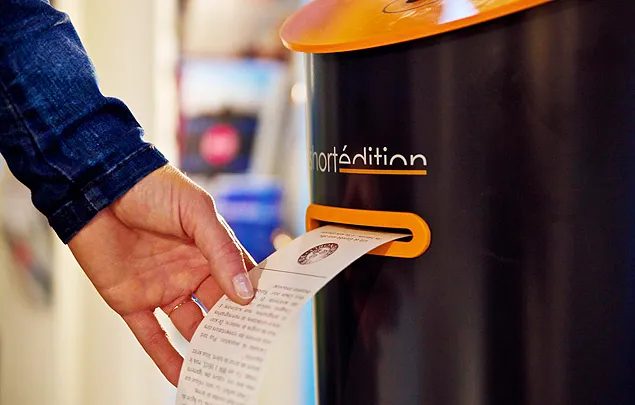
This is a machine that promises a surprise: you can not choose a story by the name or surname of the writer, but only in size: for one, three or five minutes. What kind of text you will get - a surprise, but it is unlikely that the texts will repeat: in the automatic machine 600 different stories. These stories were contested and were selected by voting out of 60,000 works. That is, the contest was 100 stories in place.
Exchange of books with strangers
In the same place, at stations, often there are also shelves for bukkrossinga - free exchange of books. You can leave a book that you just read and do not want to carry on, and take with you any of those left by someone that day. It seems that this idea also has a taste of surprise: sometimes the title of the book does not tell you anything, but if you risk opening it and opening it, you can find a friend on the road. And since trains from different countries arrive at the stations, books on the shelves come in different languages. You can meet French, Spanish, Arabic, English, Russian, Dutch ... And leave yours.
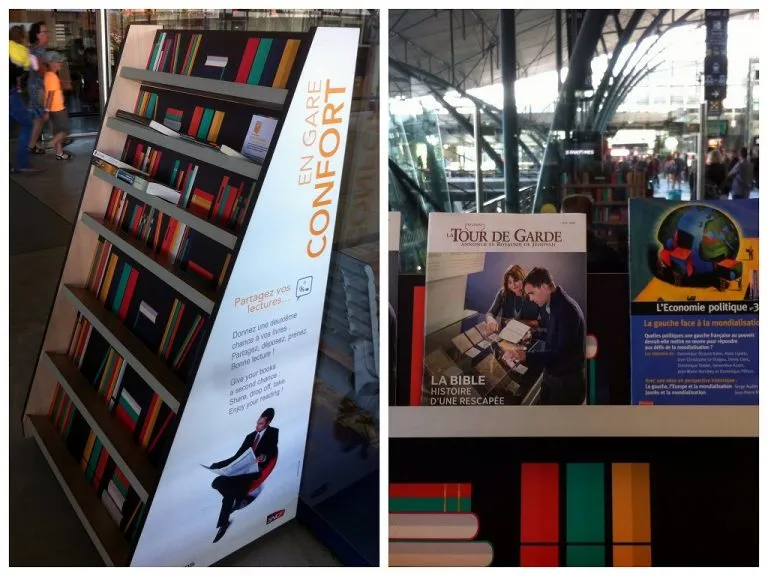
Reading does not mean sitting still
Sometimes just the opposite: to read a poem, you need to go through it. Otherwise, it will not open to you.
In the small town of Rube on the very border with Belgium stands the monument to Arthur Rimbaud. The lines of his poem "The Drunk Ship" are written under the stairs, divergent and rounded in two directions. Go down and climb them - and you will read the whole poem and feel its deliberately swinging rhythm.
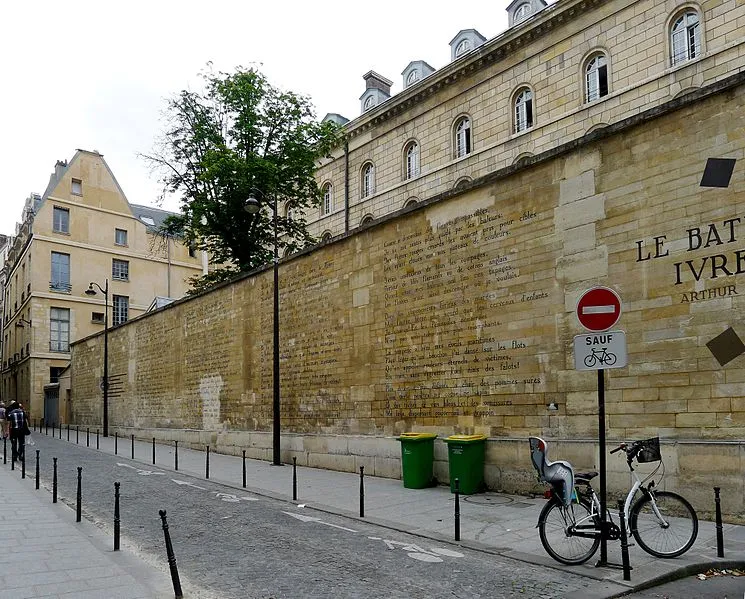
By the way, these same poems are written on the wall of the pompous building of the Tax Inspectorate in Paris. Why on this building? Because on September 30, 1871, the seventeen-year-old Rambo first read them at this very spot, in a restaurant that does not exist now.
The project was sponsored by official structures, the Dutch embassy in Paris and volunteers.
Metro in verse
The Paris Metro conducts a poetry competition every spring. It is called Grand prix poésie and is positioned as a competition for non-professional poets. You just go to the subway, write ... and then send your lines to the subway's website. The contest has three winners, one of whom is under 12, the second is over 12, but under 18, and the third is an adult. In the same categories, laureates are also announced. The poems of these people hang on the walls and in subway cars for two summer months, and some of my acquaintances know some of them even by heart.
And this is the number of poems that participated in the Grand prix poésie in 2016:
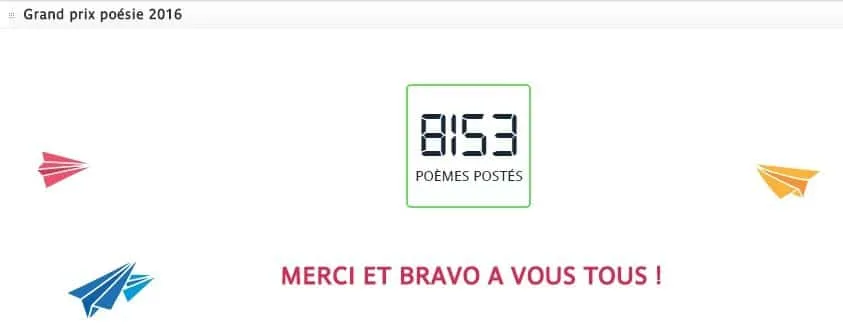
But the poem of 16-year-old Thomas LEFEVRE, which won this year:
Mes nuits sont vos jours.
Mes rêves vos cauchemars.
Mes envies vos soucis.
Ma musique pour vous que du bruit.
Je suis ado.
J’ai les parents à dos.
Interlinear translation, in which, unfortunately, the play of words is lost:
My nights are your days.
My dreams are your nightmares.
My desires are your problems.
My music is just a noise for you.
I'm a teenager.
My parents are behind my back.
As a result of the competition, the book "One hundred poems for a trip" is published, which the subway plays in its facebook.
Judging by the commentary, some people are very interested in the book and are worried that they can not win it:
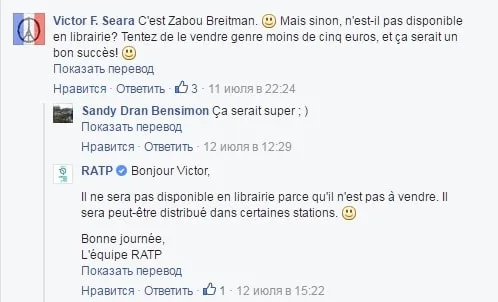
We must add that the Paris Metro supports not only poets, but also musicians, artists, designers, and for some time even Pokemon catchers.
Rentrée littéraire
Even the French textbook, published by the French themselves, begins with the theme "La Rentrée". Rentrée is the beginning of September - the time of returning from holidays, in which the French are traveling at the same time. By September, the publication of all the main books of the year is timed. This time of presentations, the time when your favorite writer releases a new book, critics compile lists of compulsory readings, and book lists lists "coup de coeur" - the chosen (or literally: "what's in the heart").
Here is a cartoon, invented by the French themselves, about this time of year:

But to whom did this nasty idea come to mind? "I thought that we could concentrate on the time for all books to leave in September, when people return to work and no one has time to read." "This is cruel!" - "I'm delighted with this idea!" - "And we'll call this time" la rentrée littéraire! ")
For example, the popular French writer Ameli Notomb publishes the book every September, starting in 1992. Many of her fans do pre-order every August to read the new novel first.
In 2016, during the rentrée from mid-August to the end of October, 560 novels will be published. 363 novel written by the French, the rest - translated.
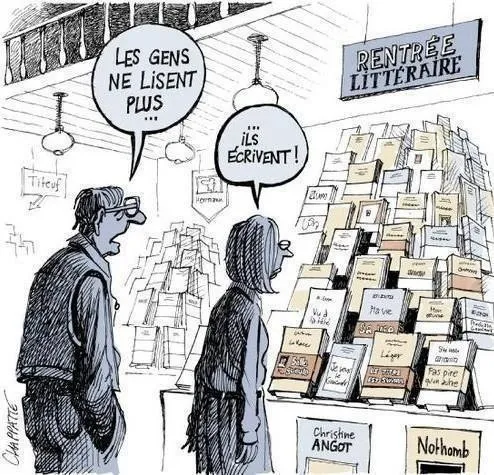
(the first remark: "People no longer read." Second: "They write!")
This article will have an extension, but for now you will be asked: what literary initiatives did you notice in your cities and travels?